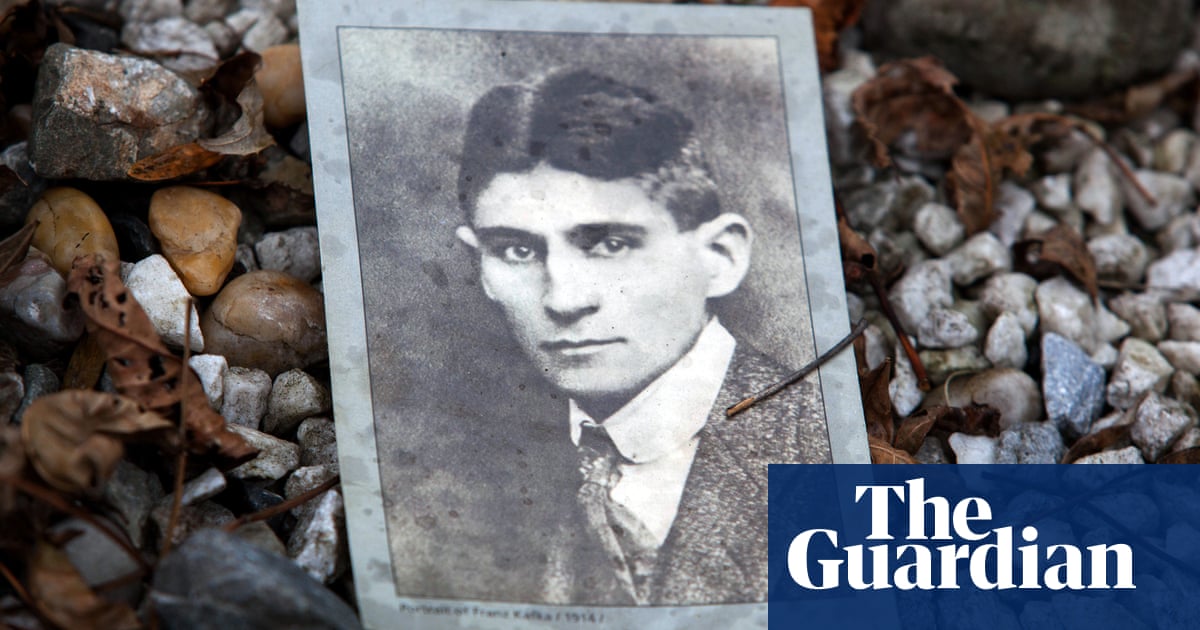
After his death on 3 June 1924, a letter was found in Franz Kafka’s office in Prague addressed to Max Brod. “Dear Max, My last request: Everything I leave behind me ... in the way of diaries, manuscripts, letters (my own and others’), sketches and so on, to be burned unread.”
His friend did not honour Kafka’s wishes. “Brod was unshakably convinced of their immeasurable value to contemporary and future humanity, and he was right,” says Ross Benjamin, whose new translation of the Czech writer’s diaries is published in this centenary year of Kafka’s death.
Two months after Kafka died, Brod signed an agreement to publish his friend’s novels. The Trial came out in in April 1925, The Castle in 1926 and Amerika in 1927. The title of the last of these was Brod’s not Kafka’s: in a 1915 diary entry, Kafka had called the novel Der Verschollene (The Missing Person).
Brod later edited a bowdlerised edition of Kafka’s diaries that, for the best part of a century, has been the basis of German editions and the English translation which, overseen by Hannah Arendt, appeared in 1949. Brod removed passages with homoerotic undertones, put a blue pencil through passages about brothel visits, excised unkind descriptions of Kafka’s fiancee, and elided sslurs on those still living, not least Brod himself.
“Kafka’s worldwide reception was shaped by a misrepresentation of what he had actually written,” writes Benjamin in his translator’s preface.
Instead, he reveals Kafka warts and all – as a sexual, troubled, sometimes self-loathing, literary experimenter – and a man more knowingly compromised than Brod thought it proper for his readers to meet.
Here are some of the fresh details that can add to our understanding of the author of Metamorphosis.
Dabbling in nudism
During a stay at a nudist sanatorium, Kafka notes that he stands out among the naked men by keeping his swimming trunks on. “I’m known as the man with the swimming trunks”. Finally, he ditched even those in order to be sketched, writing an entry that Brod trimmed: “Served as a model for Dr Schiller. Without swimming trunks. Exhibitionist experience.” Such modesty, Benjamin surmises, might have been because of shyness, or to do with being circumcised, but not because of the thesis advanced in Alan Bennett’s play Kafka’s Dick, that he had a small penis. Benjamin says: “He writes a lot about his body and his discomfort with his body (unusually tall for the time period, not an ounce of fat, etc) but not about his penis.”
Homoerotic observations
At the same nudist sanatorium, Kafka described “2 beautiful Swedish boys with long legs, which are so formed and taut that one could really only run one’s tongue along them”. Brod rendered the passage thus: “Two handsome Swedish boys with long legs.” And then there is this, Kafka’s description of a fellow train passenger, that Brod saw fit to delete: “His apparently sizeable member makes a large bulge in his pants [ie trousers].” For all that, it’s not yet the moment to dust off those “Uncensored diaries reveal gay Kafka” headlines, counsels Benjamin: “Perhaps the most that such passages tell us is that Kafka was capable of admiring and – at least imaginatively – desiring male bodies.”
Brothel talk
During one visit, Kafka noted a girl by the door, “whose scowling face is Spanish, whose putting her hands on her hips is Spanish and who stretches in a bodice-like dress of prophylactic silk. Hair runs thickly from her navel to her private parts.” Brod omitted the last sentence, which perhaps says more about his than Kafka’s erotic compunctions.
In a later entry, Kafka is among congregants at Prague’s Altneu synagogue on the evening of Yom Kippur when he notices the family of the owner of the brothel he visited a few days earlier. Brod’s editing of this entry – losing the name of the brothel – distorts Kafka’s meaning. “Where Kafka unflinchingly implicated himself in the impurity and false piety he found in the synagogue, “ says Benjamin, “the retouched text portrays Kafka was judging the other congregants from a loftier, less compromised position.”
Internalised antisemitism
Between 1911 and 1912, Kafka attended more than 20 performances by a travelling Yiddish theatre troupe, befriending one of the actors, Jizchak Löwy. In this, Kafka stood out against the prejudice of assimilated German-speaking Jewish bourgeoisie like his father towards impoverished, Yiddish-speaking Jews from the east. One diary entry Brod excised reads: “Löwy – My father about him: He who lies down in bed with dogs gets up with bugs.” Benjamin points out that such antisemitic tropes to do with hygiene, insect infection not to mention comparisons with animals, resurface in Kafka’s fiction. Hence Gregor Samsa waking up as a giant insect in Metamorphosis.
Brod cut another entry in which Kafka implicates himself in his father’s prejudices “L. confessed his gonorrhoea to me; then my hair touched his when I leaned toward his head, I grew frightened due to at least the possibility of lice.”
Contempt for his fiancee
“If F. has the same repugnance for me as I do, then a marriage is impossible,” wrote Kafka in an entry Benjamin has reinstated. The woman in question, Felice Bauer was twice engaged to Kafka before he, suffering symptoms from the tuberculosis that would kill him, broke it off with her in 1917. Brod kept many disobliging diary entries about Bauer, such as this one: “Bony, empty face that wore its emptiness openly. Bare throat. A blouse thrown on. Looked very domestic in her dress although, as it turned out, she by no means was. (I alienate myself from her a little by inspecting her so closely ...) Almost broken nose. Blonde, somewhat straight, unattractive hair, strong chin.” However, he cut one passage in which Kafka said she looked like a maid.
Workplace ennui
One day while working at the Accident Insurance Institute, Kafka found himself struggling to find a word for a bureaucratic report. In the diary he wrote: “At last I have the word ‘stigmatise’ and the sentence that goes with it, but still hold everything in my mouth with a feeling of disgust and shame as if it were raw meat, cut out of my own flesh (so much effort has it cost me). At last I say it, but retain the great horror that everything in me is ready for a literary work and such a work would be a heavenly dissolution and a real coming alive for me, while here in the office for the sake of so wretched a document I must rob a body capable of such happiness of a piece of its flesh as being like robbing his body of a piece of its flesh.”
What is Kafka up to in this suppressed passage? “He’s self-dramatising, perhaps with some degree of comic hyperbole,” says Benjamin, “and at the same time elaborating on an image that becomes part of his literary repertoire, the poetics of (often tortured and butchered) corporeality we find throughout his work.”
The literary process
Brod removed Kafka’s first great short story, The Judgment, from the diaries. This tale reverses the natural order by having a toothless, decrepit father throwing off his bedclothes and sentencing his son to death. Benjamin reinstates the story, which now sits alongside an entry expressing Kafka’s elation at writing it in a single sitting on 22 September 1912. It represented for him “the total opening of body and soul,” in which “the story evolved as a true birth, covered with filth and slime.”
Where Brod was convinced the function of a diary was therapeutic, involving the expulsion of the intolerable on to paper (“When you keep a diary you usually put down only what is oppressive or irritating,” he wrote in his postscript). Benjamin reckons Kafka was doing something more literary. It was “one of the places where he transformed what he called “the tremendous world I have in my head” into literature.
Brod’s vanity
“Although I have used the blue pencil in the case of attacks on people still alive, I have not considered this sort of censorship necessary in the little that Kafka has to say against myself,” wrote Brod in his postscript to his edition of the diaries. But a passage reinstated by Benjamin reveals otherwise. Kafka noted that a Berlin reviewer called the novelist Franz Werfel “far more significant” than Brod, and that Brod “had to strike out this sentence before he brought the review to the Prager Tagblatt [a Prague daily newspaper] to have it reprinted.” None of this appears in Brod’s edition.
Finally, I asked Ross Benjamin what he would have done if he had been Max Brod. He says he wouldn’t have burned anything either, and adds that Kafka had put his great friend in “a terrible bind”. “He knew the friend he was instructing to do this was the person least likely to be able to bring himself to do it,” says Benjamin. “From the time they met as university students, Brod had recognised his genius, championed his work, prodded him to publish against his own resistance, and been instrumental in the publication and promotion of his work while he was alive. And so giving Brod this task could be seen as a crowning act of ambivalence by the genius of ambivalence we know Kafka to have been.” Just possibly, Kafka made his request knowing it would go unhonoured.
The Diaries of Franz Kafka, translated by Ross Benjamin, is published by Penguin Classics (£24). To support the Guardian and the Observer order your copy at guardianbookshop.com. Delivery charges may apply.












